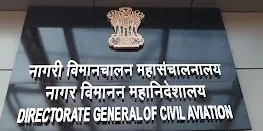Has the DGCA Initiated Special Audits for Airline Safety?

Synopsis
Key Takeaways
- The DGCA has initiated Comprehensive Special Audits to enhance aviation safety.
- Audits will cover various aviation entities from airlines to airport operators.
- Stricter penalties for non-compliance are now in place.
- Process includes a three-phase audit framework.
- Focus areas include SMS, operational efficiency, and compliance.
New Delhi, June 22 (NationPress) The Directorate General of Civil Aviation (DGCA) has mandated a series of Comprehensive Special Audits aimed at improving safety standards in the wake of the unfortunate Air India crash in Ahmedabad, which has significantly impacted the nation’s civil aviation sector.
This audit initiative will encompass a broad spectrum of aviation entities, including both scheduled and non-scheduled airlines, maintenance, repair, and overhaul organizations (MROs), flying training schools, air navigation service providers, airport operators, and ground handling agencies. This new audit framework will supplement the existing regulatory audits conducted under the annual surveillance program, imposing stricter penalties for non-compliance, which may include the grounding of airlines.
The auditing process will occur in three distinct phases: a pre-audit phase spanning five to seven days, a three-to-five-day on-site audit, and a post-audit analysis period lasting ten to fifteen days, followed by necessary follow-ups. Entities that are audited must submit Corrective Action Plans (CAPs) within 15 days of receiving their findings. The DGCA will ensure stringent oversight of the implementation of these plans.
For the audits, the regulator has organized multidisciplinary teams led by senior officials and augmented by subject matter experts from various aviation fields, conducting thorough inspections.
Key focus areas of these audits include Safety Management Systems (SMS), operational efficiency, compliance with regulatory frameworks, and crew and resource management protocols.
Officials have indicated that the decision to conduct these audits was driven by several factors, including aviation accidents, significant incidents, ongoing non-compliance issues, and observations made by the International Civil Aviation Organisation (ICAO).
Findings from these audits will be categorized into three levels: Level 1 for immediate safety threats, Level 2 for notable but non-critical issues, and a third category for long-term observations.
Entities audited are required to submit Corrective Action Plans (CAPs) within 15 days of receiving findings. The DGCA will closely monitor the implementation of these plans.
The DGCA has emphasized that non-compliance with audit recommendations could result in serious penalties, including operational suspensions or even the revocation of licenses in cases of safety norm violations.









